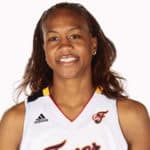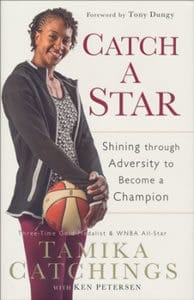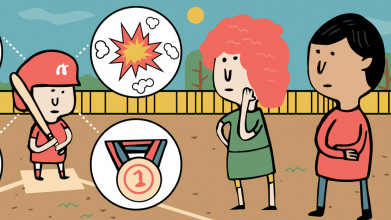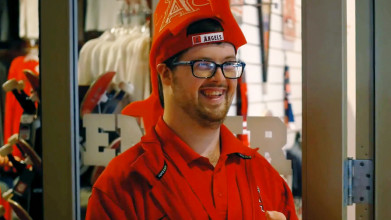
The War of Words
In this Adventures in Odyssey drama, a carelessly uttered word from Eugene creates havoc as it becomes the fashionable insult, resulting in a lesson about the power of words.
Home » Episodes » Focus on the Family Broadcast » Overcoming Adversity Through Faith and Sports
Preview:
Tamika Catchings-Smith: At that point, basketball became everything to me. You know? Like that was my God because I could go outside and I could play and I could practice and like nothing else really mattered.
End of Preview
John Fuller: That’s Tamika Catchings-Smith and you’ll hear more from her on today’s episode of Focus on the Family. Thanks for joining us. Your host is Focus president and author Jim Daly and I’m John Fuller.
Jim Daly: Uh, John, today is the opening ceremonies for the 2020 Summer Olympics in Tokyo and that may sound funny since it’s 2021 but as you probably know because of COVID, the Olympics were postponed, uh, till this summer. So to coincide with that, we want to come back to Tamika’s remarkable story. She has in the past represented the United States at the Olympics playing basketball. In fact, she and her teammates brought home the gold four times. Uh, she also has many other accolades to her name. Tamika has overcome adversity in her life by relying on her faith, her work ethic and character. Uh, by finding and cultivating her identity through sports, she’s inspired many others through her leadership. And you know, when she was with us, John, I got to shoot a few (laughs) hoops with her. That was a little embarrassing.
John: (laughs)
Jim: And she is really talented.
John: She is, yes.
Jim: Uh, what a player. We had a great time and she especially had a good time making fun of my basketball skills.
John: (laughs) Well, Tamika now serves as the general manager of the Indiana Fever, the same WNBA basketball team she played for. Uh, she’s also the founder of the Catch the Stars Foundation in Indianapolis which promotes literacy and fitness through mentors who inspire and uplift youth to help them to find purpose and achieve their potential. And when we last spoke with Tamika, she had just gotten married and was heading for the 2016 Olympics in Rio de Janeiro, and here’s how, Jim, you started that conversation.
Jim: Tamika, welcome to Focus on the Family.
Tamika: Thanks for having me.
Jim: Now the exciting part with all those achievements that you have, uh, women’s professional basketball, playing on the Olympic team in the past, uh, you’re recently married, right?
Tamika: Yes.
Jim: (laughs)
Tamika: February 7th.
Jim: February 7th?
Tamika: Yes.
Jim: That’s great. So you’re into your marriage a few months now.
Tamika: Mm-hmm.
Jim: And is going okay?
Tamika: It’s going great. (laughing) It’s going great.
Jim: That’s a tough question, isn’t it?
Tamika: Yeah.
Jim: Right from the beginning.
Tamika: Yeah, I mean, um, thank God we’ve had the, the experience of being together since 2014.
Jim: Yeah.
Tamika: So, you know, like he went through my last season as far as what it was like being with me on the road, at home, basketball, all that training and stuff. So, it works.
Jim: How long is that season in women’s basketball? How long do you go?
Tamika: We play from April and then for, so this past season, or the season that we’re in, April. We started early, April 24th, and then we’ll go… We have the Olympic break now, so July through August, then we’ll come back and finish our season and finish in October.
Jim: Wow, that is a long year.
Tamika: Mm-hmm.
Jim: And that is practically every night. You’re heading somewhere or playing somewhere.
Tamika: Playing somewhere, practicing. We do have off days, don’t worry. (laughing) But even on off days, you know, I’m doing something around basketball or something with the foundation and, you know, just trying to figure out for me now, like, what’s next?
Jim: Now, it’s interesting for you because as a little girl, uh, you were used to this because your dad played in the NBA, right?
Tamika: Mm-hmm. He played for 11 seasons, so.
Jim: 11 seasons?
Tamika: Yeah, ’84 was his last year. ’73 to ’84. I was born in ’79, so.
Jim: What teams did he play for?
Tamika: He played for Milwaukee Bucks, New Jersey Nets, Philadelphia 76ers, then the Los Angeles Clippers.
Jim: Oh, man. Did that prepare you for your life now? Could you see then what it was gonna be like?
Tamika: Interestingly enough, I really… We were around it but we weren’t really of it, if that makes sense.
Jim: Yeah.
Tamika: Like all the families would hang out together so all the kids, we would all hang out and, um, play but we would play all sports. It wasn’t just basketball. We would go to practice and I mean, we’d be climbing up, you know, in the rafters and doing crazy stuff-
Jim: (laughs)
Tamika: … ’cause that’s what kids do. And, ’cause my dad finished in America and then we actually played, he played a year over in Italy, and, um, his last season, so did that for a year and then we came back to the States and kind of moved around even in the States, so I was in seventh grade when I finally figured out, like, “Oh, my gosh. Like I really l- love playing basketball,” and this is something that I do wanna follow in my dad’s footstep.
Jim: Hm. And your childhood had some difficulties. I mean, uh, it wasn’t a easy road for you. Tell us what was going on in your life as that, uh, you know, third, fourth, fifth grader?
Tamika: Yeah.
Jim: Who were you?
Tamika: Well, I was born with a hearing problem and a speech problem and had to wear hearing aids, still wear hearing aids. And so, like I had the big hearing aids, the ones that everybody could see and, um, kinda like what you guys have on. (laughing)
Jim: We have our little earplugs in here.
Tamika: Yeah, like the little earplugs. But I got, you know, as a kid, you don’t understand the differences-
Jim: Huh.
Tamika: … and so I got teased a lot, I got bullied a lot, just, and so I struggled early on just as far as really wanting to fit in and be normal, quote-unquote, and be like everybody else. And so like that’s how sports came into my life as important as it was, because I knew that if I could practice and practiced and I got really, really good at something, people couldn’t make fun of me. So, if somebody made fun of me, I said, “Well, let’s go play basketball.” And I might lose the first time, but then I was gonna go back and practice and I guarantee the next time I was not gonna lose. And so like that was really… Early on, that was my focus.
Jim: Hm, yeah.
Tamika: You know, faith has always been a part of our family, but it was more one of those things that as a kid you just do.
Jim: Yet, Tamika, let me ask you this question because a lot of us, um, experience those things in school, but, uh, what did your mom do to just give you some support?
Tamika: Especially second grade, like that was the toughest year. First grade I was overseas, uh, we were in Italy, and then, excuse me, we moved back here and so it was tough because in Italy, everybody spoke Italian. You know, our friends spoke English but if they made fun of me, nobo- I didn’t know, you know?
Jim: (laughs) Right?
Tamika: Like, “Ah, yeah, okay. Whatever. W- let’s just go play.” And so second grade was really when I found out that I was different.
Jim: Hm.
Tamika: And I would honestly say like my mom did a great job ’cause there were days like I would come home and I would be crying and she would always wipe my tears away and just say, you know, “I’m not gonna let you give up,” and push me back out the door. And, you know, I did pretty much every single sport, every single a- activity that you can possibly do and they kept us very engaged in other sports and other activities that kind of overshadowed, you know, the getting made fun of.
Jim: Ah. And you obviously had a talent in those areas. Um, there was a moment though w- when you really, probably, were the most down and you actually took your hearing aids off and threw ’em. What, tell us about that day.
Tamika: That was the last day I was gonna get made fun of. (laughs)
Jim: That was it.
Tamika: Yeah, and I remember, I mean like I just remember going to school and getting made fun of and I was just like, “Okay, like this is it,” like this-
Jim: What would the kids say? What were they saying to you?
Tamika: Just talk about my, the way I talk, you know, because I did, I had a lisp and like I stuttered an extent because it was like, wasn’t comfortable talking. And so I knew I was gonna get made fun of so I was almost trying to be invisible.
Jim: Yeah.
Tamika: But you can’t be invisible. And then speech therapy, so I had to do speech therapy and the teacher would… the speech therapist would come to the room, open the door. Everybody looks to the door and she was like, “I need Tamika,” so then the kids are like, “Why does she get to leave?” And then, you know, come to find out I had to go to speech therapy class. So like it was the way I talked, the way I looked, just being different, you know, being tall. Um, anything and everything that you could think of.
John: And you got fed up at one point?
Tamika: Yeah, that day I got fed up and I was just like, “This is gonna be the last day.”
Jim: And what’d you do?
Tamika: Walking home, so my brother and my sister always… Like the three of us would always walk together. And to and from school it was like a big, tall field of grass, so we would walk to school and then on the way home that day I was like, “Okay.” They were in front of me just talking and I like literally took my hearing aids out, put ’em in my hand, and I threw ’em. Like-
Jim: In the field?
Tamika: In the field.
Jim: Uh.
Tamika: As far as I could. As far as I could. And then got home, we always had snacks right when we got there. Did our homework and then we did whatever sport activity we had. We had softball practice. So went to softball practice and like after practice my mom was just looking at me. She’s like, “There’s just something different about you.” I’m like, “I don’t know. I don’t know what it is.” And she finally was like, “Where are your hearing aids?”
Jim: (laughs)
Tamika: I’m like, “I don’t know. I don’t know where they’re at.”
Jim: Hm.
Tamika: And so we literally walked all the way around the softball field and I played catcher and I played left field but even though I was left field I was in the right field, the center field-
Jim: So you knew they weren’t there, though.
Tamika: Yeah, I knew. I did.
Jim: (laughs) But you just walked through the field with her.
Tamika: I didn’t lie.
Jim: The baseball field.
Tamika: I just kinda like, you know-
Jim: Yeah.
Tamika: … just telling her, “I don’t know where they’re at.” (laughing) And so we went home and, you know, we actually walked to and from school and tried to see if they had fallen out and we never found ’em but at the end of the day, my mom was just like, you know, “We can’t afford to keep buying you hearing aids, and so you’re gonna have to learn how to live without ’em.” And I guess-
Jim: Wow.
Tamika: Yeah.
Jim: How did that make you feel when she said that?
Tamika: Happy. (laughs)
Jim: Did you feel happy that you didn’t have to put ’em on?
Tamika: I was happy.
Jim: ‘Cause some children make s- think, “Ugh.”
Tamika: I was relieved.
Jim: Okay.
Tamika: You know, but I knew that in doing that, I had to figure out ways to get by.
Jim: Yeah.
Tamika: And so like my thing was I sat in the first row in every single one of my classes. I would read the textbook before I went to class and then after class, I would stay and like talk to the teacher, ’cause I can read lips. So as long as the teacher was looking at me, I was fine, but when she turned around to write on the chalkboard, and I couldn’t see her lips, so I’d have like a word and then like blank and then word then blank and like I would have to go after class-
Jim: Oh, man.
Tamika: … and have her fill in the blanks.
Jim: What did you learn from that? I mean, obviously perseverance and all those things that have made you a professional athlete, now. It, it was contributing to your ability to be resilient and be strong.
Tamika: Mm-hmm.
Jim: Wasn’t it?
Tamika: Yeah, and I think it gave me a passion. It gave me like… I am very passionate, l- like even then, like I loved school. I actually love like learning and I still love learning, that aspect.
Jim: Even with the obstacle of not hearing?
Tamika: Yeah.
John: Mm-hmm.
Tamika: Because in books, I could go places. Like I could read about, you know, like Italy. I could read about Spain. I could read about Rio. Like I could read about ’em in a book. I never really thought I’d ever go there, but in my mind, I was able to go there.
Jim: Ah.
Tamika: And so like it’s cool because through basketball, it’s allowed me the opportunity to go everywhere I read about.
John: Hm.
Jim: Tamika, where, where is God in all of this? I mean, how did you find faith with those kind of, um, you know, obstacles in your life? E- did you resent the fact that you were a little short on some of these abilities like hearing and speech?
Tamika: Not really resent. Um, we went to church. You know, like every week we were there Sunday. If we didn’t go to church on Sunday, we couldn’t participate in activities. But I think like most African-American families, like you go to church and it’s just an expectation from your parents.
Jim: Yeah.
Tamika: And if you don’t do church on Sunday, you’re not allowed to do any activity, you know, uh, during the week. And so like for us, it was that. And when we went to church [inaudible] kingdom all day. I mean, we did all of that. Um, as far as like my own personal like… So when I graduated high school and went to University of Tennessee, I remember like, “Oh, man, I, I can make my own decisions. I don’t go to church on Sunday, I still get to play basketball,” you know, and it’s more like that rebel stage.
Jim: (laughs)
Tamika: Um, and then the end of freshman year going into my, uh, sophomore year, so we came in with the Fab Four, uh, Semeka Randall, Kristen Clement, Teresa Geter, and myself.
Jim: This is University of Tennessee?
Tamika: University of Tennessee. So, yeah, so I was driving around and Pat gave me permission to move off campus, as well.
Jim: Coach Pat?
Tamika: Yeah. I was getting ready to move off campus but, um, like riding around I saw this big billboard. And it was promoting this guest speaker that would come in and just this great guy, it was gonna be an awesome message. So I remember going back to the dorm like, “Hey, guys.” Like, “We need to go. We need to do this, like we need to go to church, we need to hear this guy.” Like, everybody, I mean the billboard was absolutely amazing, just kinda pulled you in and it’s like it was just the right moment for all of us. And so we ended up going. We all came from different backgrounds. He talked about, “Who’s your daddy?” And just how, um, God is your dad, n- n- no matter what kind of a relationship you have with your earthly father, you always have a heavenly father that, you know, supersedes all of that. And so the four of us, we all had different relationship with our fathers. My mom and dad had gotten divorced when I was in sixth grade. One of ’em, her dad was around all the time. Other, another one, her dad, she hadn’t seen her dad in like four years, you know, and then another one, like her dad just kinda like was in and out and it was just like very sporadic. So like hearing that message, I mean, we were all, we were like crying and we all came down and rededicated our lives and, um, so like ever since that moment, really like my whole mind’s like i- it’s just shifted.
Jim: Yeah.
Tamika: And I knew. So I started, I mean, walking around-
Jim: S-
Tamika: … campus, I, I met a young man and he introduced me to Fellowship of Christian Athletes and so I started going to that, too, and from that point on, it was just kinda like, like this is cool.
Jim: That is great.
John: Mm-hmm.
Jim: I gave my life to the Lord at a Fellowship of Christian Athletes camp-
Tamika: Cool.
Jim: … at 15. But that was the moment, you would say, even though you had gone to church, it became your own.
Tamika: Mm-hmm.
Jim: Your faith became your own, Jesus became real to you.
Tamika: Mm-hmm.
Jim: Uh, e- e- that divorce, you went by that pretty fast in terms of your father and your mom. How old were you when they divorced?
Tamika: I was in sixth grade.
Jim: Oh, man.
Tamika: And I just remember at that point, basketball became everything to me.
Jim: Yeah.
Tamika: You know? Like that was my God because I could go outside and I could play and I could practice and like nothing else really mattered. And, um, you know, then I made my goal in seventh grade like that this was what I was gonna do and it was kinda like my way of being able to get through everything without having to talk about it.
Jim: Yeah.
Tamika: And just like basketball, basketball, basketball.
John: We’re hearing quite a story today of overcoming a lot of challenges in life from our guest on Focus on the Family, Tamika Catchings-Smith. Uh, she’s written a book capturing all the details of her incredible journey. It’s called Catch a Star: Shining Through Adversity to Become a Champion. We have copies of that for you at focusonthefamily.com/broadcast or call 800, the letter A, and the word FAMILY. Let’s go ahead and hear more now of the conversation with Tamika.
Jim: Uh, Tamika, I wanna highlight something you said that is important for the listeners to know. When you talked about, uh, the Lady Vols, uh, the-
Tamika: (laughs)
Jim: … University of Tennessee, you went 39 and 0 that one season.
Tamika: Mm-hmm.
Jim: And, uh, that was one of the great feats in women sports and that team, particularly, was noted as perhaps one of the best women’s teams of any sport. Um, that had to feel special to be-
Tamika: Yeah.
Jim: … part of something so, so perfect.
Tamika: Mm-hmm. It was. It was awesome. I mean, that was my freshman year in college so I remember just sitting back, I’m like, “Gosh, if, if every single year is like this year, (laughing) I’m in for the ride of my life.” Um, but, you know, it was just the thing that made it special, every single day like we worked. I mean, there wasn’t a day that what, blood wasn’t shed-
Jim: Ugh.
Tamika: … on the court. And it was just because against each other, like we were so competitive, but it was so much fun.
Jim: But it made you better.
Tamika: And it made us better.
Jim: In fact, uh, the coach, Pat Summitt, had a list of imperatives and, uh, let’s talk about a couple of those and we’ll list those on the website-
John: Mm-hmm.
Jim: … so others can see it. But these are great principles to live by. What were they?
Tamika: I think for me overall, like in kinda summing up all her Definite Dozen. You know, the big thing for her was just making sure we were great people. And so kinda like going through her Definite Dozen, I mean, attitude. Put the team before yourself and I can say that put the team before yourself was big for me, especially coming in my first year, uh, as a freshman and really like up until that point, I had never been told that I hadn’t done something right.
Jim: Did you think you were selfish?
Tamika: No.
Jim: Did you perceive yourself as selfish?
Tamika: No, I didn’t perceive myself as selfish, I just perceived myself that I knew, like most teenagers, (laughs) I knew everything I needed to know, right?
Jim: (laughs)
Tamika: You know, I got this crazy lady… no, (laughs).
Jim: What did she say? What did she see in you that was irritating her? And she called you out on it right on the court. What happened?
Tamika: Defense. I struggle. Yeah. And that was the first practice, literally, I got, uh, yelled at.
Jim: What’d she say to you?
Tamika: Well, so we were doing a drill and, um, it was kinda like offense/defense and I came up on the defense and I played defense the way that I’ve always played defense, which is, worked. And so she was like, “Tamika, get your butt down, get your arms out,” and I’m like, “Okay.” And I get beat like three or four times consecutively. So I go back to the end of the line and, uh, she’s like in the corner of the gym, her back is to us, like totally like not even paying attention. So I get back up and I get in my stance, the way I know, and all of a sudden like she goes, “Tamika!” And I turn around and I said, “What?”
Jim: (laughs)
Tamika: And everybody got quiet. (laughing) Everybody got quiet just like that and so like I’m mad, she’s mad. I can’t believe I just yelled back. So she calls me to the end of the baseline and she’s just like, “Do I have to handle you with lace gloves?” And that’s her way of like, you’re playing like a girl, and she hated when people say, “Oh, you play like a girl.” So that was her way and then she was like, “Do I need to send you back to Duncanville, Texas?” I’m like, “No, ma’am.” (laughs) N- you know, I’m laughing now, but then I’m like, “No,” ’cause I’m, in my mind I’m like, “If she doesn’t kill me, my mom’s gonna kill me so I might as well stay here and get killed and I’m fine with that.”
Jim: She’s kinda calling you out here.
Tamika: Yeah, definitely did. And she was just like, you know, “You need to basically buy into what we’re gonna do as a team,” and so we got through practice. After practice, like I showered and went upstairs and I apologized and that was the first and only time that we ever had a run in like that. I mean, you know, she got on me about other stuff, but, yeah.
Jim: What were a couple of the others? Just read the list real quick.
Tamika: So, one, respect yourself and others. Two, take full responsibility. That’s definitely one of hers. People made excuses to why they didn’t, you know, how, “I couldn’t be any help because I had to do this,” and it’s like, then you watch the tape and you get to see. And, you know, we got basketball players around so they know, you know. When you watch the film you get to see, uh, everything you said you thought you did, you didn’t really do. Yeah, so take full responsibility. Devel- three, develop and demonstrate loyalty. Four, learn to be a great communicator. Five, discipline yourself so no one else has to.
Jim: Hm.
Tamika: That was a big one for her. Six, make hard work your passion. Seven, don’t just work hard, work smart. Eight, put the team before yourself. Nine, make winning an attitude. Ten, be a competitor. Eleven, change is a must. That was my struggle right there. And then twelve, handle success like you handle failure.
Jim: Wow, that, those are good things to live by. In fact, I’m gonna use those with my kids-
Tamika: There you go. (laughs)
Jim: … ’cause those are great life issues and they’re very, you know, biblically based. Those are the right things. Now you get into the, uh, the women’s NBA, the WNBA, and you were drafted. Were you surprised you got drafted so high and then what happened those first seasons? I think you had some injuries, right?
Tamika: Mm-hmm. I tore my ACL my senior year in college so I didn’t even get to really finish the senior year, you know? Uh, Martin Luther King, Jr. Day, 2001. And so-
Jim: That was your knee?
Tamika: That was my knee, yeah, my right knee.
Jim: Hm.
Tamika: And so, um, I just remember like we’re literally four months from the draft. Nobody’s gonna want me. It’s almost like-
Jim: ‘Cause you’re injured.
Tamika: ‘Cause I’m injured.
Jim: Yeah.
Tamika: It’s almost like going to a store and buying something that’s already broke. Like why would you do that? And so that’s kinda like what I thought about, you know-
Jim: Hm.
Tamika: … from the draft perspective. Um, so number one pick went. I’m like, “Okay.” Number two pick went. Number three, Indiana’s on the clock and like they said my name and I had to sit there for a second. I’m like, “Wait a minute. Was that my name?” So like I jump up (laughing), so excited, like “Oh.” You know, “I’m going to Indiana.” And that was-
Jim: That had to be a great feeling.
Tamika: Oh, it was. It was.
Jim: The third person picked for the WNBA.
Tamika: Yep, yep.
Jim: And they were trusting that your knee could come back-
Tamika: Mm-hmm.
Jim: … and that you’d do okay. But what happened?
Tamika: So I sat out the first year. Um, and then in July we were in Houston, about to play the Comets, and that was the first road trip I had been on. I got cleared to start running so they were like, “Oh, we want you to start getting acclimated to the team,” and dah, dah, dah, dah. So I was like, “Okay.” So I went and I was just running straight and I felt a pop in my knee.
Jim: Mm.
Tamika: So I’m like, “Oh my God. (laughs) Please, not now.” So they, I fly back and ended up tearing, um, my meniscus. So I had to do another surgery and I’m like, “At least I have a brand-new knee, so nothing else, Lord willing, will go wrong.” And so like I literally sat out the whole year and then played in another, uh, semi-pro league up in Chicago. Had to drive back and forth in between. So that was like the year after and then started playing in 2002.
Jim: So then it took off, right? Then it just started clicking.
Tamika: Yep.
Jim: Man, it’s amazing that, um, and you said, “Hard work pays off.”
Tamika: Mm-hmm.
Jim: But that’s been one of your credos that you work hard at what you do.
Tamika: Yeah.
Jim: Um, it’s so beautiful to see how the Lord, uh, worked in your life. All right, here we are in the Olympic season. You’ve been on the ’04 Olympic team, the ’08 Olympic team, the 2012 Olympic team, and now the 2016 Olympic team. Uh, that’s quite a run.
Tamika: Yeah. (laughs)
Jim: That’s crazy.
Tamika: It’s fun. (laughs)
Jim: And, and, uh, what were the medals? Did you medal in every year?
Tamika: Yeah, we got gold.
Jim: In every year?
Tamika: Mm-hmm.
Jim: Oh, come on. Say it a little better. (laughing)
Tamika: We got gold in every year. (laughing) We did.
Jim: You’re looking at me like, “Didn’t you know?”
Tamika: We did. Come on, man. (laughs)
Jim: It’s gold every time. I mean, that’s gotta be such a heady experience. I mean, to win a gold medal every time you’re out on the floor in the Olympics. Four Olympics in a row. That’s six, 16 years, hopefully.
Tamika: Th- three in a row. [inaudible] this year.
Jim: Well, three in a row. Maybe four.
John: Four by faith.
Tamika: Yeah. Four by faith.
Jim: (laughs)
Tamika: Four by faith, yeah. Um-
Jim: Yeah. What’s that feel like?
Tamika: Amazing. It’s something you really can’t describe. I mean, you really can’t… When you’re there and you’re going through it, I mean, we, you work so hard. And like even your intensity level and just like training together and all of that, like it’s just, it’s on a whole nother level. And then when you get there and like you’re standing, like it the, the final game is over, gold medal game’s over, and you’re standing on the podium and you look to your right, you look to your left, and all your teammates, like… We’re all s- like standing there, waiting.
Jim: Yeah.
Tamika: And they start playing the national anthem, the flag’s coming down, and it’s just like y- you almost in your mind you hear the fireworks going off, you know, ’cause it’s that moment and you’re just like crying because not many people get an opportunity, A, to represent their country, B, to go and play-
Jim: Yeah.
Tamika: … and then to medal at all. Bronze, silver, or gold. Like not… A, a lot of people don’t get that opportunity but to do it three times.
Jim: Yeah.
Tamika: I mean, it’s just been a blessing.
Jim: Tell us a little more about the foundation and what you’re trying to do there.
Tamika: Well, we started it in, uh, actually 2001. When I came to Indiana, it was kinda like, “Okay, I have two choices.” One, to be mad. Go to practice, come home and just lay around, sit around, watch TV, whatever you’re gonna do. Or, two, be mad but go to practice, (laughs) you know, do my training, and then come and figure out a way to get involved in the community. And so that’s what I chose, and literally like the first event we did through the fever was a, uh, basketball camp at a local community center. And when we got done doing it, the guy that headed up the facility came over and he was like, “You are awesome with kids.” Like, “Have you ever thought about doing your own basketball camp?” And so that was the beginning of the Tamika Catchings Basketball Camp that year-
Jim: That’s great.
Tamika: … and so this year we’ll be celebrating 16 years in December.
Jim: Hm.
Tamika: And I’m passionate about giving back. You know, I think through what we do with the foundation, Catch the Star, we focus on boys and girls ages 7 all the way up to 16. And really like the overall message through goal setting, through my faith, is through setting… You know, like helping them reach their dreams and their goal. Because I look at my life and although like I went through all my adversity and all those, my parents were obviously, uh, strong in my life but it was my coaches, my teammates, my teachers that helped (laughs) me pass my classes. You know, like there were so many other people that played a important role-
Jim: Sure.
Tamika: … in my life. And so like now I feel like it’s kinda like pay it forward, like I feel like it’s my turn to do the same and be able to offer these kids hope, you know, for their future.
Jim: And you must… When they look at you, I mean, here you show up at the camp, and these are kids you don’t really know.
Tamika: Mm-mm.
Jim: And I’m sure you have lots of sideline time where you’re talking to a little seven-year-old girl.
Tamika: Mm-hmm.
Jim: Maybe she has hearing impaired issues or some other issue. How do you relate in that moment? After traveling all the steps that you’ve traveled, seeing God’s faithfulness in your life-
Tamika: Mm-hmm.
Jim: … what do you say to that seven-year-old?
Tamika: Just keep pushing. And I do, I talk about my experiences. I’m very open now, like as far as how I dealt and how I cope with everything, you know, growing up. And so a lot of the kids that we deal with, um, come from under-privileged families and so have been neglected to an extent or not all of ’em, you know, but some of ’em have been neglected or have felt like there’s nobody that cares. And so like for me in that moment, you know, really just talking about my hearing problem and talking about how I made it through. Um, actually in one of the first camps that we did, I had a mom come up to me-
Jim: Yeah.
Tamika: … and tell me like her daughter doesn’t like to wear her hearing aid, won’t wear her hearing aids, fights her to w- you know, about anything like speech therapy, you know, any of that. And so-
Jim: Sounded familiar. (laughs)
Tamika: Yeah, yeah. That’s me. (laughs) That would be me, but definitely. So I was, you know, she was telling me and then she has a sick boy. So a sick boy and then her-
Jim: Mm.
Tamika: … the little girl. And so she asked if I would be her big sister.
Jim: Wow.
Tamika: So we actually worked with Big Brothers Big Sisters and formed like that partnership with them and so like she ended up being my little sister.
Jim: Oh, man.
Tamika: And had gone on, graduated, played basketball in college, graduated from college.
Jim: Wow.
Tamika: Now she’s trying to play ball, uh, professionally overseas so we’re kinda in the midst of that. But it’s been cool for me to be a part of her journey and to know that like I’ve been one of her role models and somebody that she can look up to.
Jim: Well, that is, that is a great place to wrap this up. Uh, Tamika, it sounds like you are a deliverer of hopefulness.
John: Mm.
Jim: And the Lord’s been faithful in your life and you’re really extending that to other little boys and girls and that is precious. It’s a wonderful thing to do, so thank you for being with us.
Tamika: Thanks for having me.
John: What a memorable conversation with Olympic gold medalist and basketball great, Tamika Catchings-Smith and as the games are starting today, I do hope that you’ve been inspired by her story. And of course, as I mentioned earlier, she captured, uh, that journey of hers in the book Catch a Star: Shining Through Adversity to Become a Champion, and it is packed full of stories about Tamika’s childhood and formative years and, uh, really illustrates how faith and sports can intersect. In fact, uh, if you can make a donation of any amount to Focus on the Family today, we’ll send a copy of Catch a Star as our way of saying thank you for joining the support team. Donate, and ask for your copy of the book when you call 800, the letter A, and the word FAMILY. 800-232-6459 or stop by focusonthefamily.com/broadcast. Well, have a great weekend and join us on Monday when we hear from Pastor Ted Cunningham. He’s gonna challenge you to find a godly community that’ll support your marriage.
Preview:
Pastor Ted Cunningham: Who is it that you’re letting into your marriage and into your life? It’s why I’m grateful for Focus on the Family being a good backup singer to marriages. Who leads your duet off-key? Don’t just turn ’em down. Maybe you need to mute ’em all together.
End of Preview
John: On behalf of Jim Daly and the entire team, thanks for joining us today for Focus on the Family. I’m John Fuller inviting you back as we once more help you and your family thrive in Christ.

Tamika Catchings-Smith is a legendary former professional basketball player who led her team, the Indiana Fever, to the WNBA playoffs 13 times and to a championship in 2012. Her numerous career highlights include winning the WNBA Defensive Player of the Year Award five times and the MVP Award in 2011. She was selected to 10 WNBA All-Star teams, and when she retired following her 16th season, she was the league’s No. 2 scorer and all-time rebounder, as well as its career leader in free throws and steals. In 2020, Tamika was honored for her many incredible achievements by being inducted into the Women’s Basketball Hall of Fame. She is now a popular public speaker, a highly regarded community leader, and a board member for the organization she founded, Catch the Stars, which helps empower young people to achieve their dreams by providing programs that promote literacy, fitness, and mentoring. Learn more about Tamika by visiting her website, tamikacatchings.com.

Receive Tamika Catchings-Smith's book Catch a Star for your donation of any amount!

The magazine Christian moms trust and teen girls love! Each issue of Brio is packed with inspiring, faith-based articles and practical advice on culturally-relevant topics.

Visit our online store and purchase a CD of today's program for yourself or to share with a friend.

Kentucky listeners, visit our broadcast page dedicated to the program airing today in your state. There, you can listen to that show and find related resources for helping foster care kids.

Focus on the Family's staff of licensed, professional counselors can help you bring healing and restoration to your family with Christian perspectives you can trust.

This list excerpted from Tamika Catchings-Smith's book Catch a Star offers quick and inspiring reminders about how to pursue good character, both on the sports field and off.

How can parents help their children develop a Christian worldview toward sports?

Use your children's involvement in sports to teach them about life.

Sometimes all the lessons kids learn through sports aren't positive. Here are some tips to help you avoid the negative lessons.

Here are some helpful suggestions for finding a balanced approach to children's sports.

Margot Starbuck and David King offer advice to parents from their book, Overplayed: A Parent’s Guide to Sanity in the World of Youth Sports. (Part 1 of 2)

Unfortunately, the overzealous sports dad can push too hard and drive a wedge between him and his children. And when a father fails to curb his competitiveness, kids can learn the wrong lessons

Trevor Hendershot has Down syndrome, along with a ready smile and boundless energy. Devoted sports fans go out of their way to say hello to him at games, and Trevor greets many stadium regulars by name.

In this Adventures in Odyssey drama, a carelessly uttered word from Eugene creates havoc as it becomes the fashionable insult, resulting in a lesson about the power of words.

This discussion offers a preview of Volume #16 “Cultures in Conflict” from the That The World May Know video series, available below.

Debra Fileta will help couples better understand the four seasons of healthy relationships, what to expect during each one, and how to carefully navigate them for a stronger marriage. (Part 1 of 2)

Larnelle Harris shares stories about how God redeemed the dysfunctional past of his parents, the many African-American teachers who sacrificed their time and energy to give young men like himself a better future, and how his faithfulness to godly principles gave him greater opportunities and career success than anything else.

Amy Carroll shares how her perfectionism led to her being discontent in her marriage for over a decade, how she learned to find value in who Christ is, not in what she does, and practical ways everyone can accept the messiness of marriage and of life.

Jonathan McKee offers parents practical advice and encouragement in a discussion based on his book If I Had a Parenting Do Over: 7 Vital Changes I’d Make.